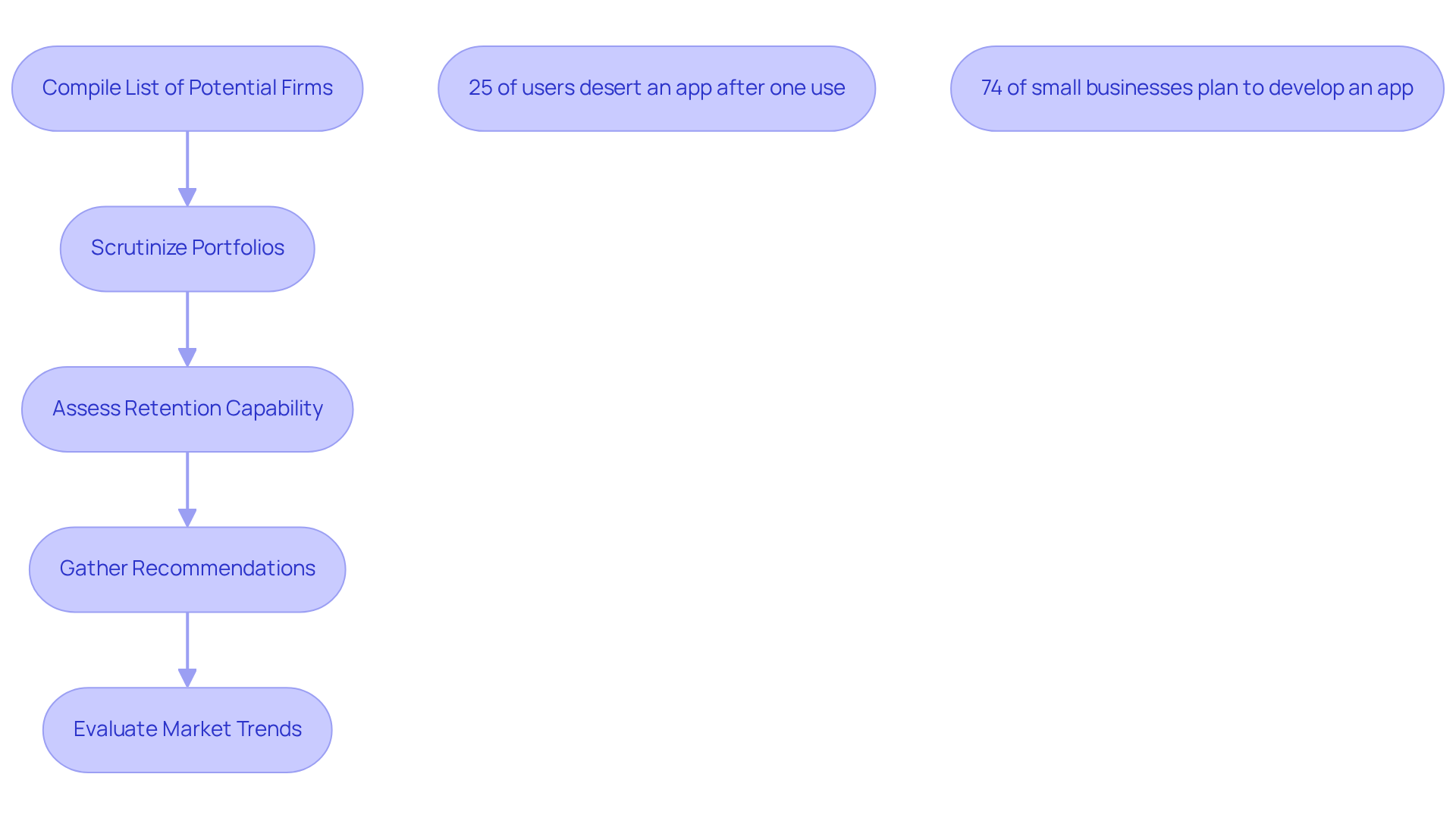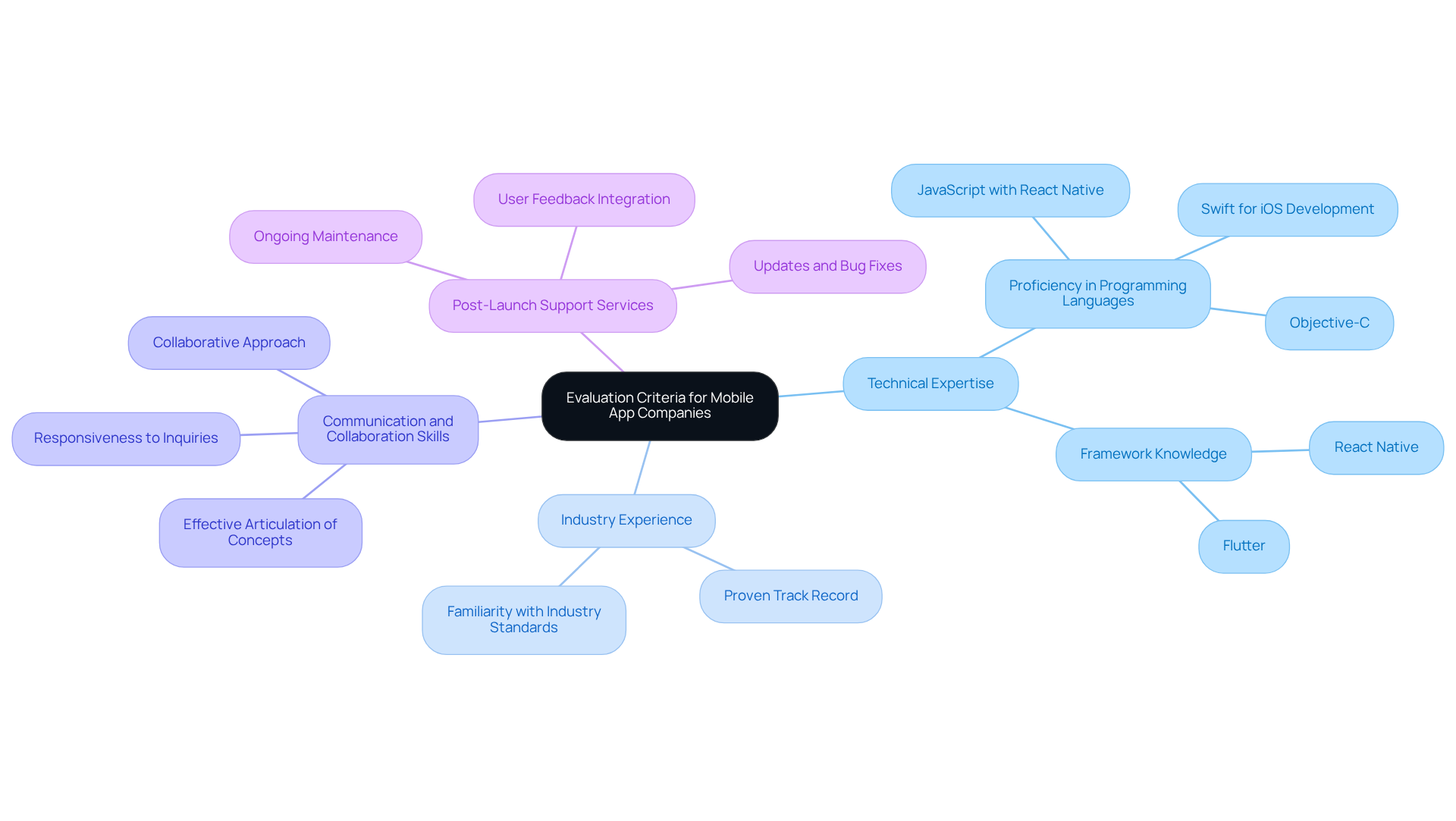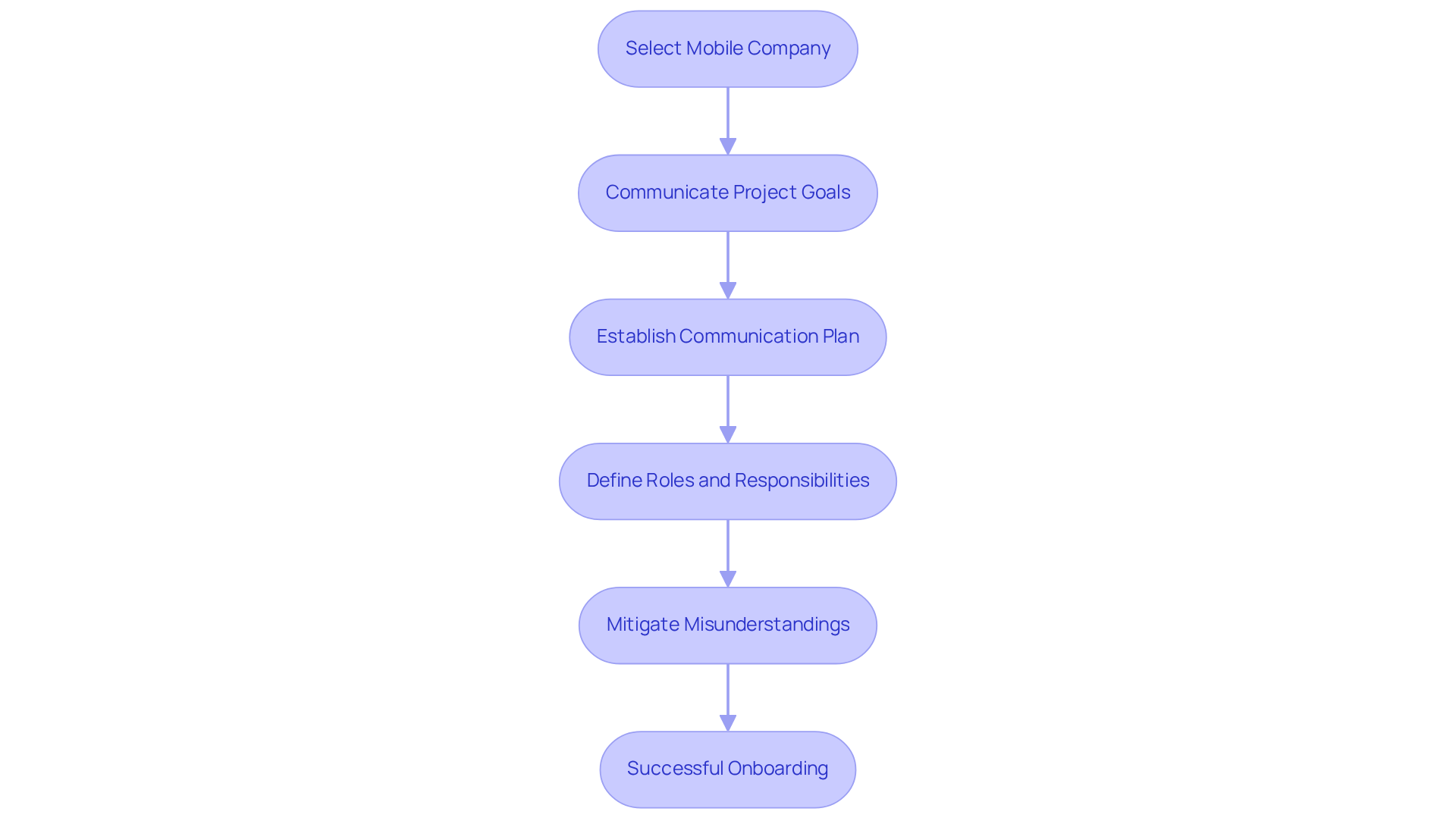AI
our blog
5 Steps to Choose the Right Mobile Company for Your Needs

Overview
Selecting the appropriate mobile company to meet your business needs requires a systematic approach. Start by clearly defining your project requirements. Next, conduct thorough research on potential firms, establishing solid evaluation criteria to assess their capabilities. Once you have a shortlist, compare these companies meticulously to identify the best fit. Finally, ensure a smooth onboarding process with the chosen partner.
This article underscores the necessity of clarity in project objectives and the rigorous evaluation of technical expertise and industry experience, as these elements are crucial to the success and longevity of mobile applications.
Introduction
Selecting the right mobile company is a pivotal decision that can profoundly influence a business's growth and customer engagement. As the mobile app market is set for significant expansion, it is essential to grasp the critical factors involved in choosing the right partner.
How can businesses effectively navigate the complexities of this choice to ensure alignment with their strategic goals and secure enduring success?
Define Your Business Requirements
Begin by explicitly defining your business objectives and the specific functionalities required from the mobile company’s application. Key considerations encompass your target audience, desired features, budget constraints, and timelines. For instance, if enhancing customer engagement is paramount, prioritize a mobile company with a proven history of developing user-friendly interfaces and integrating AI-driven features. Diligently documenting these requirements will serve as a valuable reference during the selection process, mitigating the risks associated with vague objectives, which contribute to 29% of failures, and where 22% of all IT initiatives surveyed did not meet their goals.
Industry insights reveal that 77% of successful app developers underscore the significance of a clear project vision. Additionally, consider the anticipated costs linked to the mobile company app development, including design expenses ranging from $10,000 to $15,000 and production costs from $40,000 to $60,000. This clarity not only aligns expectations but also enhances communication with potential collaborators, ultimately leading to more successful outcomes. Furthermore, the geographical location of your team can significantly impact expenses and should be factored into your planning.

Research Potential Mobile Companies
To identify suitable mobile app development firms, leverage a variety of online resources, including industry directories, review platforms, and social media channels. Begin by compiling a list of potential candidates and scrutinize their portfolios, particularly focusing on projects that align with your specific needs. Look for detailed case studies that illustrate their problem-solving capabilities and success in meeting client objectives.
Significantly, approximately 25% of users desert an app after one use, highlighting the necessity of assessing an organization's capability to develop captivating apps that retain users. Furthermore, tapping into your professional network for recommendations can be invaluable; personal referrals often lead to reliable partnerships. Given that 74% of small businesses without a mobile app plan to develop one in the near future, and that 46% of respondents who built an app described themselves as being 'very satisfied' with its performance, ensuring you select a firm with a proven track record is essential for staying competitive in the rapidly evolving mobile app market.
As the mobile app market is projected to expand at a compound annual growth rate (CAGR) of 13.8% from 2023 to 2030, the importance of choosing the right partner for creation cannot be overstated. Hiren Kalariya emphasizes that user experience, performance, regular updates, and retention strategies are key to long-term success.

Establish Evaluation Criteria
To efficiently assess mobile companies that create apps, establishing a detailed list of criteria tailored to your project requirements is essential. Key factors to consider include technical expertise, industry experience, communication and collaboration skills, and post-launch support services.
-
Technical Expertise: Evaluate the company's proficiency in relevant programming languages and frameworks, such as Swift for iOS or JavaScript with React Native for cross-platform development. This expertise is vital for ensuring high-quality app performance and functionality, particularly as 32% of developers utilize JavaScript with React Native in 2024.
-
Industry Experience: Seek firms with a proven track record within your specific industry. Their familiarity with industry standards and user expectations can significantly enhance the relevance and effectiveness of your app.
-
Communication and Collaboration Skills: Effective communication is crucial for a successful partnership. Assess how well the company articulates concepts, addresses inquiries, and collaborates throughout the process. In a competitive landscape where the average smartphone user interacts with 30 apps monthly, robust communication can distinguish a development partner.
-
Post-Launch Support Services: Consider the availability of ongoing support and maintenance services following the app's launch. This includes updates, bug fixes, and user feedback integration, all of which are critical for long-term success.
Once you have identified these criteria, assign weights to each based on their significance to your undertaking. For instance, technical expertise might carry more weight than post-launch support if your project requires advanced features. This organized method will facilitate a more impartial evaluation of the firms you are considering, ultimately leading to a more informed choice.
Statistics indicate that 25% of users abandon an app within the first day, underscoring the importance of selecting a partner that prioritizes user engagement and retention strategies. By focusing on these assessment standards, you can ensure that the mobile company you choose aligns with your objectives and delivers a product that meets user expectations.

Compare Shortlisted Companies
Using the evaluation criteria you established, score each shortlisted mobile company based on their performance in each area. Consider conducting interviews or meetings with the top candidates to discuss your initiative in detail and gauge their understanding and enthusiasm. This interaction can provide valuable insights into their working style and how well they might align with your team. Notably, 72% of job seekers evaluate the interview process when deciding on job offers, highlighting the significance of effective communication and rapport. Furthermore, hiring a new employee can cost up to 30% of their annual salary, underscoring the financial implications of hiring decisions. Gather your scores and notes to enable a side-by-side comparison, ensuring you make a well-informed choice that aligns with your objectives. Remember, nearly 60% of bad hires occur because employees do not meet the employer’s quality standards, making thorough candidate evaluation crucial.

Make Your Selection and Onboard
Once you have selected a mobile company, you should initiate the onboarding process by clearly communicating your project goals, timelines, and expectations.
- Establish a communication plan that outlines how often you will meet and the preferred channels for updates.
- Ensure that both teams understand their roles and responsibilities to foster a collaborative environment.
- This proactive approach will help mitigate potential misunderstandings and set the stage for a successful partnership.
As noted, 66% of employees struggle with job responsibilities during onboarding, emphasizing the need for clarity. Furthermore, 63% of customers consider onboarding crucial for subscription decisions, highlighting its importance for a mobile company in mobile app development. A well-constructed onboarding experience can improve return on value, enhancing customer satisfaction and retention.

Conclusion
Selecting the right mobile company is a pivotal decision that can profoundly impact the success of your business's mobile strategy. By meticulously defining business requirements, researching potential firms, establishing evaluation criteria, comparing shortlisted companies, and effectively onboarding your chosen partner, organizations can ensure alignment with their objectives and enhance user engagement.
The significance of clarity in project goals cannot be overstated. From initial requirements to ongoing support, each step demands diligent consideration and thorough evaluation. By concentrating on essential factors such as technical expertise, industry experience, and effective communication, businesses can identify a mobile company that not only addresses their current needs but also fosters long-term growth and innovation within a competitive landscape.
In a rapidly evolving mobile market, it is crucial to navigate these steps thoughtfully. Organizations are encouraged to leverage the insights and strategies outlined here to make informed decisions that will cultivate successful partnerships and ultimately yield impactful mobile solutions. The right mobile company can indeed be a game-changer, empowering businesses to engage effectively with their audience and drive success in the digital age.









